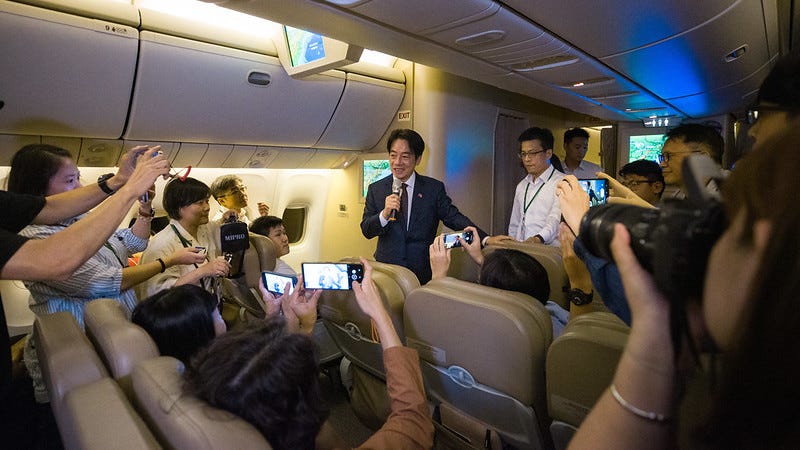Lai Ching-te's stopover in the U.S.: views from Beijing
Lai's transit stop in the United States this time is lower-profile compared with previously or similar stops made by his fellows in the past.
Lai Ching-te, the candidate for Taiwan's 2024 leader election from the region's ruling Democratic Progressive Party (DPP), arrived in the United States for a "stopover" over the past week.
According to the politician's Facebook, he arrived in New York City on Aug. 12 (local time), where he participated in a community welcome banquet. He arrived in Paraguay on Aug. 14 to attend the inauguration of the president of the South American county. Lai made another layover in San Francisco Aug. 17 en route back to Taiwan.
Lai's journey attracted attention from China watchers, as the Taiwan question, sometimes with China-U.S. relations involved, is a focus of attention on China from overseas. One of the most popular articles by Ginger River Review (GRR) is exactly about the Taiwan question.
GRR interviewed several scholars for their comments on Lai's journey. The following is an excerpt from the interview from three perspectives: Why did Lai seek a stopover in the United States regardless of opposition from Beijing and protests on the island? Did he reach his goal? What kind of impact will this "stopover" visit have on his election, the cross-Strait relations and beyond?
1.Question: What is the purpose of Lai's stopover in the United States?
Zheng Zhenqing, vice professor at the Institute of Taiwan Studies of Tsinghua University
清华大学台湾研究院副教授 郑振清
Zheng Zhenqing: It is one of Taiwan politicians' traditions to make stopovers in the United States under the guise of paying visits to Latin-American counties. They hope to use such transit stops to seek contact with the U.S. politicians, and meanwhile increase their public exposure by accepting interviews and other activities.
Lai's "stopover" visit to the United States this time was out of the purpose of maintaining his high-profile presence by meeting with the U.S. politicians and holding public activities there.
Lai Ching-te speaks with traveling press aboard aircraft en route to Paraguay
Liu Xiangping, director of the Taiwan research institute of Nanjing University
南京大学台湾研究所所长 刘相平
Liu Xiangping: In fact, almost all the candidates for Taiwan leader election would go to the United States to "pledge allegiance." Otherwise, the United States would manage to head off his or her election, which is actually interference in China's internal affairs by manipulating Taiwan's election.
Lai's journey is actually a political maneuver he has intended for long under the disguise of a "stopover" in the United States. He attempted to use this "stopover" visit to campaign for his 2024 election. On the other hand, he hoped to "pledge allegiance" to the United States to win endorsement for his election.
Zhang Wensheng, deputy head of the Taiwan research institute of Fujian-based Xiamen University
厦门大学台湾研究院副院长 张文生
Zhang Wensheng: Lai's journey is purposeful both for himself and for the DPP authority. The DPP hoped to show off its "close ties" with the United States through this journey, while Lai attempted to win support from the U.S. side for his election.
But the U.S. side has doubt in Lai. Therefore, Lai hoped to use this stopover to wash off his label of advocating "Taiwan independence" and even a warmonger and dispel the United States' concern about him. In the meantime, he also hoped to make up for the mistrust of people in Taiwan in him.
2.Question: How did the United States react to Lai's stopover?
It can be easily found that Lai's transit stop in the United States this time is lower-profile compared with previously or similar stops made by his fellows in the past.
The news release published on the website of Taiwan leader shows that during his stop in New York, Lai did not participate in any official activities or have contacts with the U.S. administration, except attending a banquet with communities of locals and people of Taiwan in New York City and holding an in-person discussion with young Taiwanese-Americans.
Lai holds discussions with young Taiwanese-Americans from various sectors in New York
Li Zhenguang, deputy head of the Taiwan research institute of Beijing Union University
北京联合大学台湾研究院副院长 李振广
Li Zhenguang: Under the dual pressures of strong opposition from Beijing and cautious handling by the White House, Lai's "stopover" this time has shown some restraint. The "stopover" has also brought great pressure on the United States, which does not want this issue to further deteriorate its relations with Chia. Therefore, it has placed strict constraints on Lai's words and actions, which have proven effective.
The low-profile stance taken by the United States is actually a choice born out of necessity. If the Taiwan question is mishandled, it might worsen the currently tense China-U.S. relations and even cause severe turmoil across the Taiwan Strait. Faced with strong opposition from the Chinese government, the United States maintains a high level of vigilance against Lai's political maneuvering, strictly constraining his statements and actions. This is essentially a kind of crisis management.
The policy-making of the United States has always been prioritizing its own interests. Therefore the United States has no choice but to adopt a low-key approach, as the deterioration of China-U.S. relations due to the Taiwan question is not in its national interests.
The White House's lack of confidence in Lai is evident. In fact, the United States has a very accurate understanding of Lai and is well aware of his obstinate and impulsive political nature, which makes it hard to control him. Based on this consideration, the United States would naturally approach any evaluation of Lai with caution and would impose multiple political constraints on him to prevent him from making rash actions if he were to be elected.
Liu Xiangping: Due to Lai's stubborn advocation of "Taiwan independence," the United States, which has always been supporting the candidate from the DPP side, shows a more balanced approach this time. Lai’s extreme advocation of “Taiwan independence” is divergent from the United States’ current China policy. The United States is suspicious of him. He is doomed to fail the "test of loyalty" this time.
As the Russia-Ukraine conflict is still ongoing, the United States would not like to see the situation across the Taiwan Strait getting out of control and be involved in two different conflicts. As a result, the United States does not want the "Taiwan independence" force to grow too fast and too strong. It wants to properly control Lai's steps.
Lai’s rash remarks about “entering the White House,” without the consent of the United States, has eroded the U.S. commitment to Taiwan. The United States is not happy about that.
Wang Yingjin, director of the cross-Strait relations research center of the Renmin University of China
中国人民大学两岸关系研究中心主任 王英津
Wang Yingjin: Lai preemptively announced his plan to "enter the White House," attempting to visit the United States under the pretext of a "stopover" with an aim at new breakthroughs in U.S.-Taiwan relations. He expected to thus enhance his own stature and convey a message to Taiwanese society that the United States trusts him. If he passed the "interview" by the United States, it could aid his prospects for the 2024 elections.
However, based on the actual circumstances, the United States took an unusual approach this time. Not only did they not allow him into the White House, but even officials of relatively higher positions did not meet him. Lai's "stopover" in the United States received a cold reception, reflecting that the White House holds reservations about trusting him and is concerned about his "Taiwan independence sentiments," further affirming the United States' doubts about Lai.
There are three reasons for the United States to adopt a low-key approach. First, the United States is unwilling to let Lai’s “stopover” ruin the slightly eased yet delicate U.S.-China relations in the current stage. Second, under strong pressure from the Chinese mainland, the United States adopted a low-key stance regarding Lai's “stopover” to avoid excessively provoking the mainland. Third, the United States holds a reserved attitude toward Lai.
In conclusion, under the compulsion of various pressures, the White House took a relatively restrained attitude and approach towards Lai's "stopover" this time compared to before.
3.Question: What consequences would Lai's journey bring about?
Sixty-three-year-old Lai quit his career as a doctor and entered politics in the 1990s. He has been an advocate of “Taiwan independence” ever since.
At the very beginning of his political career in the 1990s, Lai was once shot holding the slogan of “Taiwan independence” publicly. In 2015, as then Tainan mayor, he repeated three times “I advocate Taiwan independence” at the city council. In 2017, at Taiwan's legislative body, Lai called himself a “pragmatic worker for Taiwanese independence” and claimed that “Taiwan is already a sovereign independent country,” which he claimed again in a recent interview with Bloomberg.
During the interview taking place ahead of his “stopover” visit to the United States, Lai said “We are willing to cooperate with China to advance peace and prosperity” and that his responsibility is to “maintain the status quo in the Taiwan Strait while protecting Taiwan and maintaining democracy, peace, and prosperity.” But will these be realized if Lai wins the election?
Liu Xiangping: Lai has for many years described himself as a frontrunner of "Taiwan independence" and has stirred up troubles for relations across the Taiwan Strait and even for stability and peace in the Asian-Pacific. If he won the election, the peace and stability of the Asian-Pacific would face more troubles and even "subversive" consequences. So did this "stopover" escalate the tension across the Strait.
Wang Yingjin: Calling himself a "pragmatic worker for Taiwan independence," Lai would surely collude with the United States and Japan after his election, running die-hard on the path towards "Taiwan independence." This would inevitably lead to sharp deterioration of cross-Strait relations, even to the brink of war.
While for the possible impact of Lai's journey on DPP's election situation, it is now hard to say it is positive or negative.
Zhang Wensheng: Lai can be said to be a bigger troublemaker after Chen Shui-bian, because Lai is more radical than Chen Shui-bian and Tsai Ing-wen on cross-Strait line, and is a very stubborn Taiwan independence element. It is very difficult for him to change his political stance, and he will only take confrontational means.
If Lai Ching-te is elected, he will inevitably make the situation between the two sides of the Strait more tense and more antagonistic. Lai and the DPP have gone further and further on the road of "Taiwan independence," and he has indeed made many people from the Chinese mainland feel that there is no hope for peaceful reunification. With more and more such thoughts, I am afraid that in the future, the mainland may be forced to adopt non-peaceful means to solve the Taiwan question, which is not what the Chinese people on both sides of the Strait want to see.









I'd think he'd want to soften his pro-independence stances before the election. The DPP got beat pretty bad in 2022.